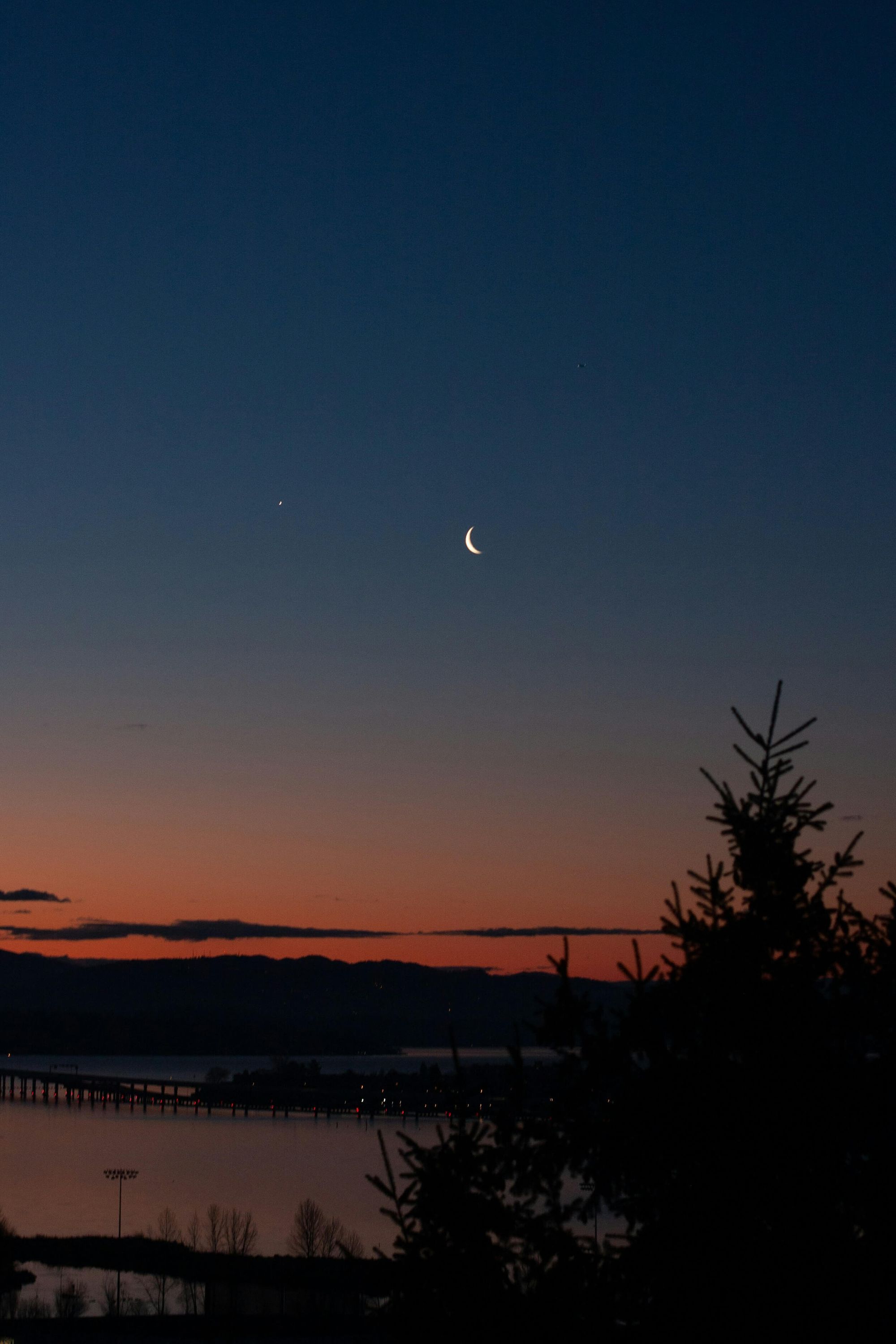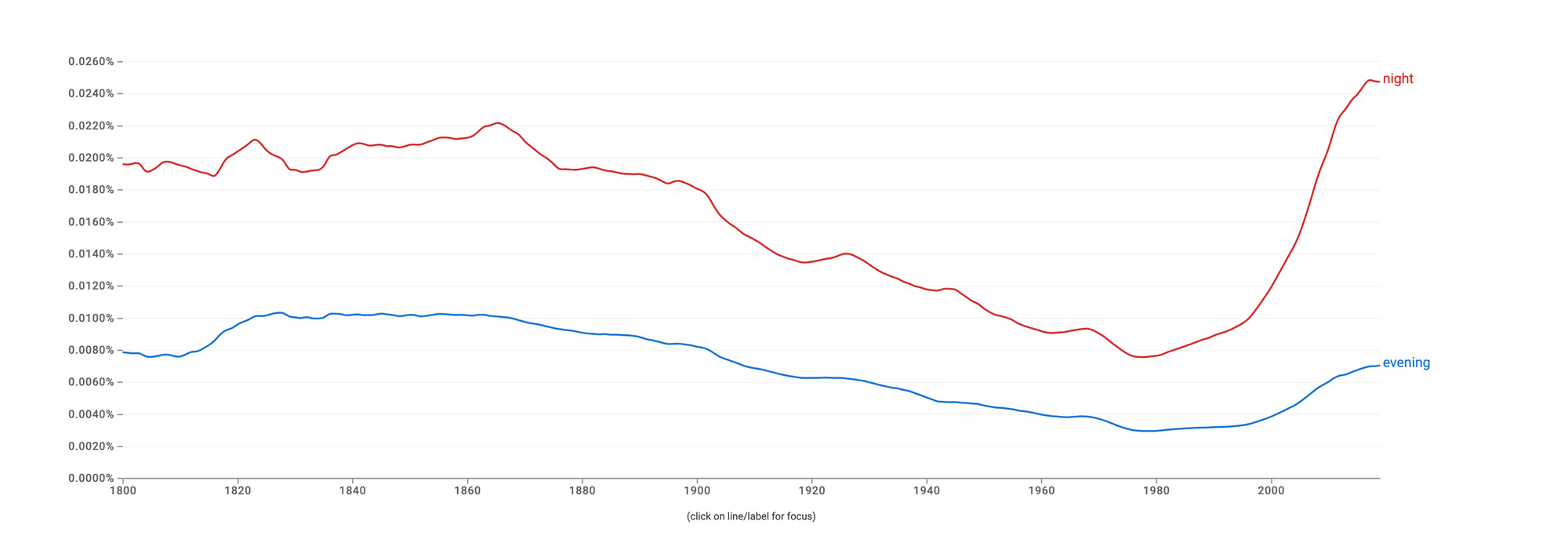- "Evening" refers to the period of time between the late afternoon and night, characterized by the diminishing daylight and the approach of darkness. It is often associated with the later part of the day, typically starting around sunset.
- "Night" is the period of darkness that occurs after sunset and before sunrise, marked by the absence of natural sunlight. It is a time when the sky is usually dark, and many people rest or sleep during this phase of the day.
In the sentence "We decided to take a leisurely stroll in the park during the tranquil evening," the term "evening" refers to the period of time characterized by diminishing daylight and the approach of darkness, usually starting around sunset
⭐ The city lights shimmered under the starry night sky as we walked through the quiet streets, appreciating the serenity that enveloped the world during the peaceful night hours.
In the sentence "The city lights shimmered under the starry night sky as we walked through the quiet streets, appreciating the serenity that enveloped the world during the peaceful night hours," the term "night" refers to the period of darkness after sunset and before sunrise.
When to use evening
The word "evening" can be used in a few different ways, depending on the context:
Time of day:
- Generally: Evening is typically considered the period between the end of the afternoon and the beginning of night. This can vary depending on location and season, but it's usually somewhere between 5:00 PM and 9:00 PM. So, you might say "I met my friend for dinner after work in the evening."
- Specifically: If you're talking about a specific event or activity that happens in the evening, you can use it more precisely. For example, you might say "The concert starts at 7:00 PM in the evening."
Figuratively:
- Pleasant or relaxing: "Evening" can also be used to describe a time that is pleasant or relaxing. For example, you might say "I enjoyed a quiet evening at home reading a book."
- Romantic: Evening can also be associated with romance and intimacy. You might say "We had a lovely evening candlelit dinner for two."
Here are some additional factors to consider when using "evening":
- Location: As mentioned above, the exact time of "evening" can vary depending on where you are. In some places, sunset happens much earlier than others.
- Culture: Different cultures have different ways of defining and using the word "evening."
- Personal preference: Ultimately, the best way to use "evening" is the way that feels most natural and comfortable to you.
When to use night
when exactly do we use this word? It depends on the context, of course, but here are some of the most common scenarios:
Literally, the dark hours:
- Sleep time: From sunset to sunrise, night is when most of us catch some Zzz's. So, you could say, "After a long day, I'm ready to hit the hay and get a good night's sleep."
- Darkness and quiet: Nighttime brings darkness and stillness, which can be perfect for activities like stargazing, taking a moonlit walk, or simply enjoying the peace and quiet. You might say, "Let's go outside and appreciate the beauty of the night sky."
Figuratively:
- Mystery and intrigue: Night often evokes a sense of mystery and intrigue, making it a popular setting for detective stories, thrillers, and horror movies. You could say, "The detective spent the night investigating the crime scene, determined to find the culprit."
- Romance and intimacy: The darkness and quiet of night can also set the mood for romance and intimacy. You might say, "We enjoyed a candlelit dinner and a slow dance under the stars – it was a magical night."
Additionally:
- Specific events: Certain events often happen at night, like concerts, parties, or theater shows. You could say, "I'm going to the jazz concert tonight – can't wait!"
- Figurative expressions: We use "night" in various figurative expressions, like "good night" (to say goodbye or wish someone sleep) or "pull an all-nighter" (to stay up all night working or studying).
Evening typically refers to the time between late afternoon and nightfall, often associated with the fading daylight. Night, on the other hand, is the period of darkness after sunset. Distinguish them by the presence or absence of natural sunlight during these phases of the day.
Examples from the web
Evening
"Based on research that showed that half of readers read the newspaper in the evening, the aim was to create a title that would be 'as relevant at 9am as 9pm.'" - The Guardian
"That result will be known on Friday evening." - The Guardian
Night
"Later, on Tuesday night, he said it was 'categorically false and defamatory.'" - The Guardian
"I was amazed to find that I slept that night without waking up once, and I can't remember the last time that happened." - The Guardian

Usage of evening and night
Examining the graph below, we can see that "night" is used more frequently than "evening," especially in the 2000s.

FAQ
Is 7pm at night or evening?
7 pm is considered evening. Evening usually starts around sunset and extends until nightfall. While there is no strict boundary, evening encompasses the time when the day transitions from late afternoon to night, and 7 pm falls within this period.
What hours are evening or night?
Evening typically spans from late afternoon, around 6 or 7 pm, until nightfall. Night, in a general sense, starts after evening and extends until sunrise the next day. The exact hours can vary, but evening precedes night and covers the transition from daylight to darkness.
Can I say good evening at 7.30 pm?
Yes, saying "Good evening" at 7:30 pm is appropriate. Evening generally begins around sunset, and at 7:30 pm, you're still within that timeframe. It's a courteous greeting for the later part of the day, expressing goodwill as the day transitions to night.

Want to sound like a native speaker?
Engram’s AI-powered grammar checker makes your English sound like a native speaker’s, suggesting natural English expressions on top of fixing grammar, spelling, punctuation, word order, and vocabulary.

References:















